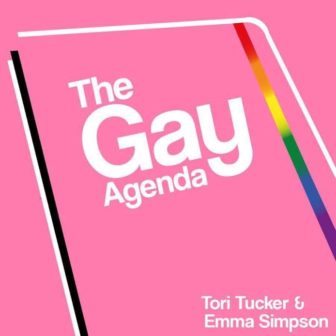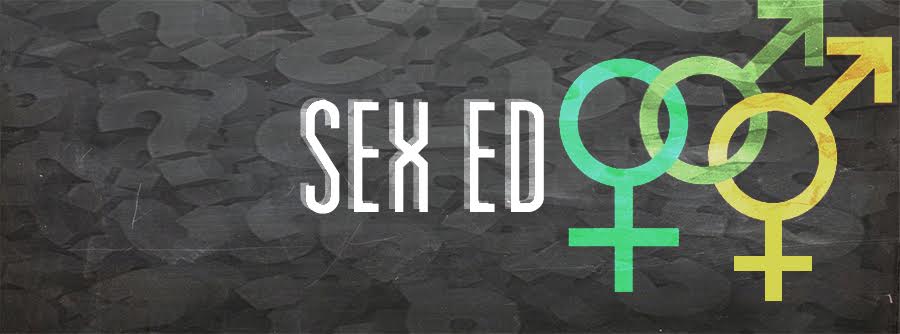By Emma Simpson
When someone mentions “sex ed,” what comes to mind? Scared-looking teenagers rolling condoms on bananas? Or maybe, like me, you picture the scene from the iconic film Mean Girls in which sex education consists of a man in ill-fitting gym shorts shouting at a classroom of students not to touch each other lest they “get pregnant and die.” There has been a lot of conversation regarding what information students need to keep themselves safe and healthy, but now information about STD prevention and different forms of contraception are widely taught throughout the state.
 Though these things are important to sexual health, they fail to address a very pertinent issue: these curriculums are based around the assumption that all students are heterosexual and cisgender.
Though these things are important to sexual health, they fail to address a very pertinent issue: these curriculums are based around the assumption that all students are heterosexual and cisgender.
As a fourteen-year-old freshman at Spaulding High School in Rochester, I took the required general health class hoping to get it out of the way early. Aside from labeling the male and female reproductive organs and doing a project on the effects of LSD, I don’t remember a whole lot except that the only mention of LGBTQ sexuality involved a teacher saying gay men have a higher risk for HIV/AIDS. And of course the “always wear a condom” speech. No woman-to-woman sexual activity was ever mentioned, and transgender identities were brought up only once when a student mentioned an acquaintance who was female-to-male transgender and asked if having a crush on him “made her a lesbian.” The teacher responded with a curt “no” before quickly moving on. It wasn’t until the last few months of my senior year that I took an elective class on women’s health that I learned anything about sex involving women specifically, and even then it was brief at best.
I spoke with Morgan Sulham, a public health major at Keene State with a passion for sex education, who said that she, too, did not receive information on LGBTQ sex at her high school in Bath, N.H. Though she is heterosexual, she understands that the lack of information can harm LGBTQ folks who are learning about sex and sexuality. She told me about the Guttmacher Institute, a nonprofit organization dedicated to furthering sexual and reproductive health in the U.S. According to the Institute, only 13 states require that information provided in health classes be medically accurate. In four states, only negative information can be provided about people who are not heterosexual.
I was surprised and disappointed to find out that New Hampshire is not one of the states mandating medically accurate curriculums.
I also spoke with my girlfriend Tori about her experience with sex ed at Portsmouth High School. She said there was nothing more explicit than a brief “if you’re gay, don’t get AIDS” statement, but her health class watched Milk, a film about Harvey Milk who was the first openly gay American politician to be elected in California during the 1970s. I found this to be an interesting choice as if they were trying to send the message that “gay is okay,” but they could have said it more explicitly. Though the film has an overarching positive attitude toward gay people, showing a film such as this does not provide LGBTQ teens with information about sex.
I don’t know anyone who was provided with any information about people who may be transgender or nonbinary or women who may be bisexual or lesbians. Though women in same-sex relationships and those in nonbinary relationships are sometimes not at risk of pregnancy, transfer of STDs is still a significant concern. Forms of protection such as dental dams (thin sheets of latex that can be used to cover the vulva or anus during sexual activity) and female condoms are available, yet many people don’t know how to use them, or even that they exist.
There are resources such as the Planned Parenthood website, which provides information on almost any contraceptive you could find as well as information about sexuality in general, but many people don’t know where to look. We must take a stand for the LGBTQ community to provide teenagers with accurate information about sex and sexuality so they can make good choices and stay healthy, safe, and hopefully happy.
Resources:
(Information on how to have safer sex.)
(Information about different sexualities and gender identities)
(Information about sex ed in all 50 states.)
Tori Tucker and Emma Simpson are Keene State College students who work on the column The Gay Agenda together. It is posted every Sunday at InDepthNH.org

Tori Tucker
Tori Tucker was born and raised in Portsmouth, New Hampshire. She is a student, author, and activist, and is currently in her senior year at Keene State College where she is finishing her English-Writing BA. In addition to being a writing student Tori also is pursuing minors in music and German.

Emma Simpson
Emma Simpson is a Women’s and Gender Studies major currently in her junior year at Keene State College. She is the vice president of her campus a cappella group and involved with Planned Parenthood as a volunteer.





